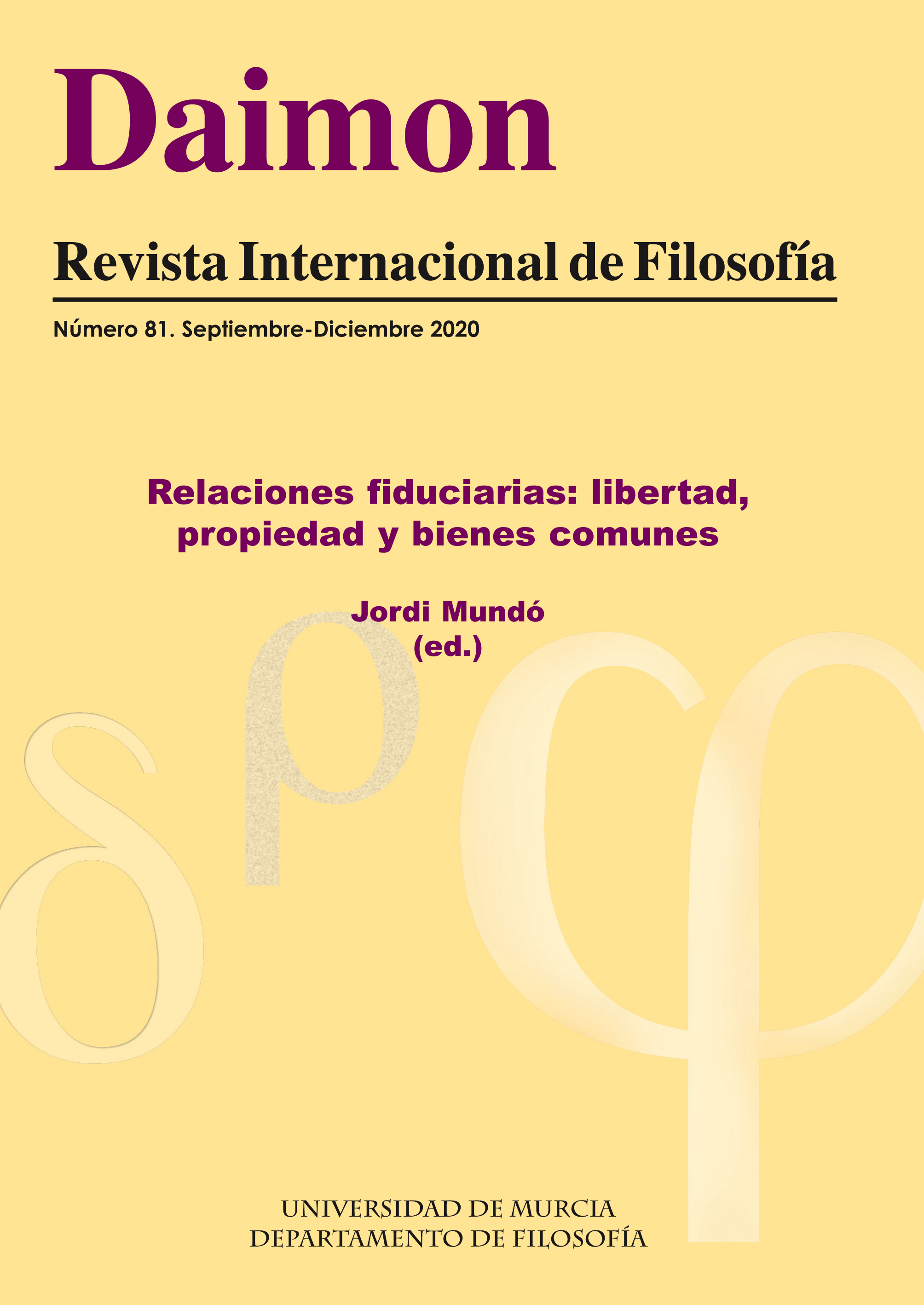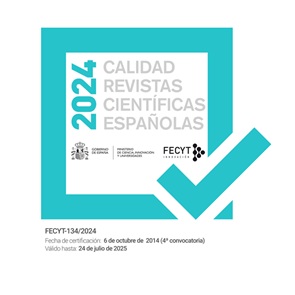Ni absoluta, ni exclusiva. Una reconstrucción de la concepción de la propiedad jeffersoniana
Resumen
Este texto aborda la concepción de la propiedad republicana-jeffersoniana y defiende que el principio político-filosófico que subyace a la misma es el del pacto fiduciario. Para ello se exponen las características de las relaciones fiduciarias diferenciándolas a su vez de las contractuales. Para ilustrar este tipo de relaciones, se abordan dos casos de estudio estrechamente relacionados en el republicanismo de Jefferson: las instituciones políticas y la propiedad. Se pretende así mostrar que su concepción republicana-fiduciaria es la que alimenta el principio de la “utilidad pública” de la propiedad privada presente todavía hoy en el constitucionalismo moderno y democrático.
Descargas
-
Resumen569
-
PDF393
Citas
Antieau, Ch. (1960), «Natural Rights and The Founding Fathers-The Virginians», Washing- ton and Lee Law Review, 17, pp. 43-79.
Appleby, J. y Ball, T. (eds.). (1999), Thomas Jefferson. Political Writings, Cambridge: Cambridge University Press.
Blackstone, W. (1897), Commentaries on the Laws of England, Philadelphia: West Publishing Company.
Callies, D. y Breemer, D. (2000), «The Right to Exclude Others from Private Property: A Fundamental Constitutional Right», Washington University Journal of Law & Policy, 3, pp. 39-59.
Cicerón, M. T. (1948), De los Deberes, Morán, B. E. (trad. y ed.), México: Universidad Autónoma de México.
Clarry, D. (2014), «Fiduciary Ownership and Trusts in a Comparative Perspective», International and Comparative Law Quarterly, 63, 4, pp. 901-933.
Coghill, K., Sampford, Ch., y Smith, T. (eds.) (2012), Fiduciary duty and the atmospheric trust, Surrey: Ashgate Publishing Limited.
Congost, R. (2003), «Property Rights and Historical Analysis: What Rights? What History?», Past & Present, 181, pp. 73-106.
Criddle, E. J. (2017), «Liberty in Loyalty: A Republican Theory of Fiduciary Law», Texas Law Review, 95, pp. 993-1060.
Criddle, E. (2014), «A Sacred Trust of Civilization: Fiduciary Foundations of International Law», en: Gold, A. y Miller, P. (eds.). Philosophical Foundations of Fiduciary Law, Oxford: Oxford University Press, pp. 404-422.
Criddle, E. y Fox-Decent, E. (2018), «Guardians of Legal Order. The Dual Commissions of Public Fiducia», en:
Criddle, E.; Fox-Decent, E.; Gold, A.; Hui Kim, S. y Miller, P. (eds.): Fiduciary Government, Cambridge: Cambridge University Press, pp. 67-95.
Domènech, A. y Bertomeu, M. J. (2015), «Property, freedom and money: Modern Capitalism reassessed», European Journal of Social Theory, 19, 2, pp. 245-263.
Ely, J. W. (1992), The Guardian of Every Other Right. A Constitutional History of Property Rights, New York: Oxford University Press.
Epstein, R. (1985), Takings: Private Property and the Power of Eminent Domain, Cambridge: Harvard University Press.
Finn, P. (2012), «Public Trust and Fiduciary Relations», en: Coghill, K., Sampford, Ch., y Smith, T. (eds.), Fiduciary duty and the atmospheric trust, Surrey: Ashgate Publishing Limited, pp. 31-41.
Ford, P. (ed.), (1904-5), The Works of Thomas Jefferson, XII Vols., New York & London: The Knickerbocker Press.
Fox-Decent, E. (2014), «Fiduciary Authority and the Service Conception», en: Gold, A. y Miller, P. (eds.). Philosophical Foundations of Fiduciary Law, Oxford: Oxford University Press, pp. 363-387.
Fox-Decent, E. (2011), Sovereignty’s Promise: The State as Fiduciary, Oxford: Oxford University Press.
Fox-Decent, E. y Criddle, E. (2009), «The Fiduciary Constitution of Human Rights», Legal Theory, 15, pp. 301-336.
Frankel, T. (2011), Fiduciary Law, New York: Oxford University Press.
Godden, L., Grinlinton, D. y Taylor, P. (2011), «Communal Governance of Land and Resou- rces as a Sustainable Property Institution», en: Grinlinton, D. y Taylor, P. (eds.), Property Rights and Sustainability, Leiden: Martinus Nijhoff Publishers, pp. 249-272.
Hartz, L. (1955), The Liberal Tradition in America: An Interpretation of American Political Thought since the Revolution, New York: Harcourt Brace & Co.
Jefferson, T. (1812), «The Proceedings of the Government of the United States in Maintaining the Public Right to the Beach of the Missisipi, Adjacent to New Orleans Against the Intrusion of Edward Livingston», The American Law Journal, V, Baltimore, New York.
Laitos, J. G. (1998), Law of Property Rights Protection: Limitations on Governmental Powers, New York: Wolters Kluwer.
Lee, A. (1775), An Appeal to the Justice and Interests of the People of Great Britain, in the Present Disputes with America, London: J. Almon.
Leib, E. J y Galoob, S. (2016), «Fiduciary Political Theory: A Critique», The Yale Law Journal, 125, pp. 1820-1878,
Leib, E.; Ponet, D. y Serota, M. (2014), «Mapping Public Fiduciary Relationships», en: Miller, P. y Gold, A. (eds.). Contract, Status, and Fiduciary Law, Oxford: Oxford Uni- versity Press, pp. 388-403.
Lewis, C. (1985), «The Modern Conception of Ownership of Land», Acta Juridica, pp. 241- 266.
Lynd, S. (1969), Intellectual Origins of American Radicalism, London: Faber & Faber. Lubens, R. (2007), «The Social Obligation of Property Ownership», Arizona Journal of International & Comparative Law, 24, 2, pp. 389–449.
MacGilvray, E. (2011), The Invention of Market Freedom, Cambridge: Cambridge University Press.
Madison, J. (2001), «The comparative means of influence of the federal and state governments», en: Carey, G. y McClellan, J. (eds.), The Federalist, Indianapolis: Liberty Fund.
Mansfield, H. (2003), «Liberty and Virtue in the American Founding», en: Berkowitz, P. (ed.), Never a Matter of Indifference: Sustaining Virtue in a Free Republic, Stanford: Hoover Press, pp. 3-28.
Markovits, D. (2014), «Sharing Ex Ante and Sharing Ex Post. The Non-Contractual Basis of Fiduciary Relations», en: Gold, A. y Miller, P. (eds.). Philosophical Foundations of Fiduciary Law, Oxford: Oxford University Press, pp. 209-224.
Miller P. (2018), «Fiduciary Representation», en: Criddle, E.; Fox-Decent, E.; Gold, A.; Hui Kim, S. y Miller, P. (eds.). Fiduciary Government, Cambridge: Cambridge University Press, pp. 21-48.
Miller, P. (2014), «The Fiduciary relationship», en: Gold, A. y Miller, P. (eds.). Philosophical Foundations of Fiduciary Law, Oxford: Oxford University Press, pp. 63-90.
Natelson, R. (2004), «The Constitution and the Public Trust», Buffalo Law Review, 52, pp. 1077-1178.
Purdy, J. y Fielding, K. (2007), «Sovereigns, Trustees, Guardians: Private-Law Concepts and the Limits of Legitimate State Power», Law and Contemporary Problems, 70, pp. 165-221.
Rave, T. (2018), «Two Problems of Fiduciary Governance, en: Criddle, E.; Fox-Decent, E.; Gold, A., Hui Kim, S. y Miller, P. B. (eds.). Fiduciary Government, Cambridge: Cambridge University Press, pp. 49-66.
Rave, T. (2013), «Politicians as Fiduciaries», Harvard Law Review, 126, 3, pp. 671-739.
Richard, C. (1994), The Founders and the Classics. Greece, Rome, and the American Enlightenment, Cambridge, Mass.: Harvard University Press.
Samet, I. (2014), «Fiduciary Loyalty as Kantian Virtue», en: Gold, A. y Miller, P. (eds.). Phi- losophical Foundations of Fiduciary Law, Oxford: Oxford University Press, pp. 125-140.
Sheehan, J. y Small, G. (2002), «Towards a Definition of Property Rights», Artículo pre- sentado en la Pacific Rim Real Estate Society (PRRES) conference, Christchurch, New Zealand, Enero 2002.
Sherwin, E. (2016), «Formal Elements of Contract and Fiduciary Law», en: Miller, P. y Gold, A. (eds.). Contract, Status, and Fiduciary Law, Oxford: Oxford University Press, pp. 167-181.
Simon, W. (1991), «Social-Republican Property», University of California Law Review, 38, 6, pp. 1335-1414.
Smith, G. (2016), «Firms and Fiduciaries», en: Miller, P. y Gold, A. (eds.). Contract, Status, and Fiduciary Law, Oxford: Oxford University Press, pp. 293-311.
Smith, L. (2016), «Contract, Consent, and Fiduciary Relationships», en: Miller, P. y Gold, A. (eds.). Contract, Status, and Fiduciary Law, Oxford: Oxford University Press, pp. 117-138.
Sitkoff, R. (2014), «An Economic Theory of Fiduciary Law», en: en: Gold, A. y Miller, P. (eds.), Philosophical Foundations on Fiduciary Law Oxford: Oxford University Press, pp. 197-208.
Vaitkus, S. (1991), How is society possible? lntersubjectivity and the fiduciary attitude as problems of the social group, Dordrecht: Kluwer Academic Publishers.
Whelan, F. (1980), «Property as Artificie: Hume and Blackstone», Nomos, 22, pp. 101-129.
Wood, G. (2011), «The Legacy of Rome in the American Revolution», en: Onuf, P. y Cole, N. (eds.). Thomas Jefferson, the Classical World, and the Early America, Virginia: University of Virginia Press, pp. 11-34.
Las obras que se publican en esta revista están sujetas a los siguientes términos:
1. El Servicio de Publicaciones de la Universidad de Murcia (la editorial) conserva los derechos patrimoniales (copyright) de las obras publicadas, y favorece y permite la reutilización de las mismas bajo la licencia de uso indicada en el punto 2.
2. Las obras se publican en la edición electrónica de la revista bajo una licencia Creative Commons Reconocimiento-NoComercial-SinObraDerivada 3.0 España (texto legal). Se pueden copiar, usar, difundir, transmitir y exponer públicamente, siempre que: i) se cite la autoría y la fuente original de su publicación (revista, editorial y URL de la obra); ii) no se usen para fines comerciales; iii) si remezcla, transforma o crea a partir del material, no podrá distribuir el material modificado.
3. Condiciones de auto-archivo. Se permite y se anima a los autores a difundir electrónicamente las versiones pre-print (versión antes de ser evaluada) y/o post-print (versión evaluada y aceptada para su publicación) de sus obras antes de su publicación, ya que favorece su circulación y difusión más temprana y con ello un posible aumento en su citación y alcance entre la comunidad académica. Color RoMEO: verde.











